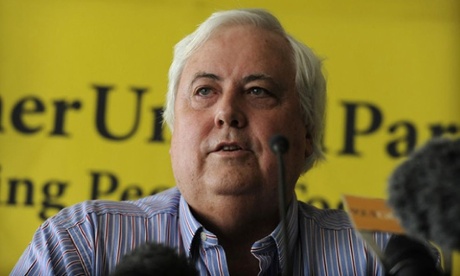Palmer’s opposition means the compromise measure could not pass the Senate even if the government accepted it

The Australian Medical Association’s attempt to recast the GP co-payment debate has failed to resolve the Senate impasse, with Clive Palmer standing firm against the compromise proposal.
The government also signalled it was not prepared to accept the AMA’s model, arguing the suggestions would produce a windfall for doctors and “wipe out” 97% of the $3.5bn budgeted savings.
Labor and the Greens oppose a Medicare co-payment as a matter of principle, asserting that it would undermine the principle of universal access to healthcare regardless of wealth. The measure cannot pass without support of the Palmer United party (PUP) senators.
“We’re against any co-payment,” Palmer told Guardian Australia on Thursday.
Asked whether he had a favourable view of the AMA compromise, including exemptions for pensioners, the PUP leader repeated his general opposition: “We’re against any co-payment – can’t be more clear.”
The AMA called on the government to cut the proposed $7 co-payment for GP visits to $6.15, with blanket exemptions for concession card holders and patients under 16. The government would pay the amount for those groups.
The government’s proposal to cut $5 from Medicare Benefits Schedule (MBS) rebates received by GPs would also be axed under the AMA’s plan, which was released on Thursday.
The AMA’s solution, if adopted, would threaten the $3.5bn that the government had budgeted over five years for the medical research future fund.
The government had planned to reduce MBS rebates by $5 for standard GP consultations and out-of-hospital pathology and diagnostic imaging services and allow the providers of these services to collect a patient contribution of $7 per service. This meant $2 of the proposed $7 co-payment would go to the provider.
The health minister, Peter Dutton, said the AMA chief was a “strong advocate for his colleagues, as is his job” but signalled the government’s serious concerns about the compromise proposal.
“I note that the current proposal put forward by the AMA with regards to the $7 co-pay will result in a windfall for doctors while wiping out 97% of the government’s estimated savings,” Dutton said.
The AMA’s president, Brian Owler, who provided the proposal to the government weeks ago, said on Thursday the measure outlined in the budget was “seriously flawed” and should be dumped.
Explaining the AMA’s alternative, Owler said: “We propose a minimum $6.15 co-payment – which aligns with the current bulk-billing incentive – that applies to all patients, but the government will pay the co-payment for concession card holders and patients under 16 years of age.
“Under our model, there will be no cut to the Medicare patient rebate, and there is an incentive for general practices to collect the co-payment.”
Owler said the AMA “supported well-designed and well-intentioned co-payments, and that is what we are releasing today”.
“Co-payments already exist. About 20% of GP visits currently attract a co-payment,” he said. “The AMA co-payment model allows GPs the opportunity to spend more time with their patients, provide preventive health care and chronic disease management, and place a value on the essential service they provide.”
Owler said he was confident the proposal would “stimulate robust debate”.
The treasurer, Joe Hockey, said on Thursday the government was “always prepared to have sensible discussions with sensible people” to ensure the protection of the most vulnerable, but also wanted to ensure the system was affordable in the future.
“I’ve already met with the AMA and they have already put a proposal to the minister for health. I’m glad that they do support the concept of a co-payment. I think that is hugely important,” Hockey said.
Tony Abbott said he respected and valued Medicare as an “iconic Australian institution” but the introduction of a “modest co-payment” would ensure that people valued the vital services they received.
Labor’s treasury spokesman, Chris Bowen, said the opposition would defend the “important principle” that people should be able to go to the doctor as many times as needed regardless of their income.
Terry Barnes, a former health adviser to Abbott when he was health minister, called for scrutiny of the AMA plan to ensure it was in the interests of all, not just the AMA’s members. Barnes kickstarted debate over a GP co-payment in a submission to the government’s commission of audit late last year.
